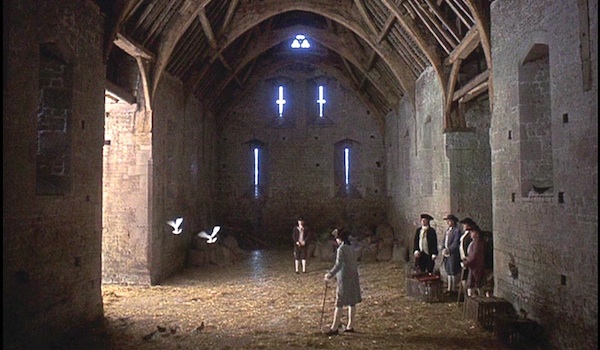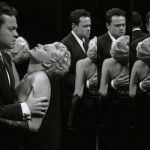Barry Lyndon Review
Posted on April 10, 2012 By John Gilpatrick 1970s, Classic Reviews, John's Hall of Fame, Movie Reviews
One would think a three-hour British period drama would be something to endure, rather than enjoy, but Barry Lyndon is damn near a flawless film. Not only that, it’s also endlessly watchable. It’s as well-paced and plotted as any film I can recollect, and director Stanley Kubrick‘s sense of time and place is remarkable. The film is often regarded as “lesser Kubrick” (if there is such a thing), but for me, there are few Kubrick films greater than Barry Lyndon.
Our title character (played by Ryan O’Neal) begins his life a poor Irish farm boy named Redmond Barry. His father dies when he’s very young (in a duel with another man), so he grows up quite close to his mother (Marie Kean). He’s also quite close to his cousin, Nora (Gay Hamilton), but she has eyes for Captain John Quin (Leonard Rossiter), who could provide a much better life for the Barry clan than a Redmond/Nora pairing ever would. Redmond, not one to take a rebuke like this lying down, challenges Quin to a duel, and it’s the former who comes out alive.
His mother gives him what little money she has and sends him off to Dublin until the situation cools down. Once there, however, he joins the military and gets his first taste of life with some privilege. He eventually deserts, but is forced to join the friendly Prussian army after being outed by a Captain Potzdorf (Hardy Kruger). Years go by, and Redmond continues plotting and scheming his way out of undesirable situations until he captures the heart of a Lady Lyndon (Marisa Berenson). She’s married to a sickly older man, but the life she promises is precisely the one Redmond has always longed for. Unfortunately, as he later learns, the very characteristics that brought him to this place are the ones that could lead to a spectacular fall from grace.
If every Kubrick film deals with man’s “best of times, worst of times” to a certain degree, Barry Lyndon does so most plainly and most powerfully. There’s nothing plain, of course, about the film’s look, but the qualities that sometimes feel like secondary themes in other Kubrick films are undeniably front and center here. Two title cards inform us that the first half of the film chronicles the means by which Redmond Barry acquired the style and title of Barry Lyndon, while the second half focuses on the misfortunes and disasters that befell Barry Lyndon. Such an explicit spelling out of the film’s thesis in no way harms one’s ability to appreciate or connect with it. On the contrary, with the false notion of subtlety cast aside right away, we can invest ourselves wholly in this absorbing character and the absolutely fascinating contradictions that make him up.
If Barry Lyndon was simply an attempt to prove the viability of “Napoleon”, as has been written and discussed in the years since its release, it’s hard to tell. This film is exquisitely crafted, and the screenplay (written solely by Kubrick—his second consecutive, but final, solo writing effort) is sheer perfection. Based off of a famous novel by William Makepeace Thackeray, the film chronicles the long and very full life of one man, and Kubrick lets everything play out as it should without resorting to shortcuts that might save time or add excitement at the expense of character development. One example of this is the relatively lengthy sequence during which he two-times Potzdorf and helps a fellow Irishman (Patrick Magee’s Chevalier de Balibari) escape a potentially sticky situation. The character dynamics in that moment are a little tricky, but they prove absolutely vital to setting up the rest of the film. Kubrick smartly lets everything develop, while editing these scenes in such a way that the relatively light tone and breezy pace of the film’s first half don’t let up.
The quality of the writing, however, somehow pales in comparison to the way the world of Barry Lyndon is captured by Kubrick. The costumes are jaw-dropping. The set design and the cinematography, particularly the way natural light is used, are incredible. And the score is an all-time great. It shouldn’t come as a great surprise, then, that the film won Oscars in all four of these categories. It was nominated for three others, and struck out—all three times for Kubrick himself, in Best Picture, Best Director, and Best Adapted Screenplay.
A film like this obviously needs a strong central performance to work, and Ryan O’Neal proves himself more than up to the task. While he’s on his way up, he’s naive but resourceful. On more than one occasion, he gets outsmarted, but these aren’t situations he forgets easily. Every time he gets knocked down, he picks himself back up, but more importantly, he’s sure never to get knocked down in the same way again. Once he reaches his pinnacle (shortly after marrying Lady Lyndon, who’s also well-realized thanks to Marisa Berenson), he becomes sloppy. He’s reliant on his mother to continue helping him move up, but a number of social and financial slip-ups cause him irreparable damage to his reputation, and after his absolute biggest personal setback—a tragedy, really, that occurs late in the film—he’s a lost cause. In all this, however, O’Neal never loses sight of who Redmond Barry/Barry Lyndon is: A man dissatisfied with ordinariness.
So despite being three hours long and about a seemingly unremarkable group of 18th-century European aristocrats, Barry Lyndon is captivating and amazing. It doesn’t reach the impossibly high bar Kubrick set with 2001 and Dr. Strangelove, but it’s unquestionably in the director’s excellent second tier of films—films that would top almost any other director’s filmography. Anchored by O’Neal and made all the better by Kubrick’s unparalleled eye for detail, Barry Lyndon is the period piece every director dreams he or she could pull off, and it’s something even skeptics of the genre should seek out. There isn’t anything stuffy about this film. Its themes are universal, and its quality seems unmatchable.
1975, 2001: A Space Odyssey, 4 Stars, Barry Lyndon, Best Picture Nominee, Dr. Strangelove, Gay Hamilton, Hardy Kruger, John Alcott, Ken Adam, Marie Kean, Marisa Berenson, Patrick Magee, Ryan O'Neal, Stanley Kubrick, Steven Berkoff, Tony Lawson















